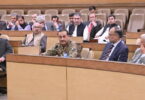Rustam Shah Mohmand
There are credible reports of the Taliban agreeing to a short cease-fire as soon as an agreement with the US is concluded. Since the draft of the agreement is almost finalized with the consent of both sides, it appears an accord will be signed perhaps by the end of the month to end the long war.
The agreement has been brokered after a year-long process of negotiations held in Doha, Qatar, between representatives of the Taliban and the US negotiating team headed by Afghan American Zalmay Khalilzad.
The consensus document stipulates a specified period of time for the withdrawal of all foreign forces from Afghanistan, in return for tangible guarantees by the Taliban that the country will not be used as a staging ground for launching attacks on other countries.
Reportedly, the accord signing will be followed by an intra-Afghan dialogue between the Taliban and other political groups including the government in Kabul to determine and agree on future governance systems for the war-torn country. Reports are, the intra-Afghan parleys are likely to take place in Germany.
The Taliban agreeing to a cease-fire for a limited period is a substantial concession, and a good sign, because in the past the group has consistently refused to accept any cessation in hostilities as long as foreign forces were present in the country. They believed that any cease-fire –if it does not deliver peace on their terms– could split their movement. They also feared that once their cadres of volunteers went back to their villages, it would be impossible to motivate them to return and fight again. Some in Taliban ranks also suspected a cease-fire offer was a US trap to end the resistance against foreign occupation.
The resumption of peace talks after their bizarre cancelation by President Trump in September last year has been possible due to the untiring work of US special envoy Zalmay Khalilzad’s team and the flexibility shown by the Taliban to end the conflict.
The signing of an agreement will be a historic breakthrough for the country, the US administration, and the Taliban. It will undoubtedly open many paths to a grand reconciliation.
However, it will also be the beginning of a long and difficult journey to create a national consensus on governance systems in Afghanistan. The fate of the existing parliament, the constitution and Afghan government, will be debated and discussed with Taliban who have their own agenda to implement. This will be a formidable challenge for all stakeholders.
A resolution to this complex situation could be found in the convening of another ‘Loya Jirga’ or Grand Assembly tasked with the formation of a transitional government that includes the Taliban as a dominant or significant partner.
The current Afghan government will not yield or compromise their position easily. It will require a tremendous amount of persuasion, incentive, and intimidation by the US to force the regime to accept a consensus formula that guarantees them a share in the new dispensation.
It would be a herculean task to integrate the many disparate groups into a loosely unified coalition that agrees on the fundamentals of a new political and constitutional order for the country.
But there is no alternative to a negotiated and carefully choreographed transition to a new system that delivers peace and participation to all segments of the population. Not only that, future governance systems will have to be debated and solutions found and there will be many other issues requiring attention.
The existence of CIA sponsored militias that operate with impunity in the whole country will have to be decided on. The issue of war crimes or crimes against humanity will also have to figure prominently in the discussions and policies to be formulated. Warlords who keep their private armies will have to be prevailed upon to dismantle such militias. The problem of opium production and the existence of tens of thousands of heroin addicts will have to be addressed. And more importantly, the issue of the economy and jobs will have to be confronted and resources created to reduce the dependence on foreign assistance.
The country sits on untapped mineral resources to the tune of more than $1 trillion in value. That asset constitutes a crucial ingredient for the socio-economic emancipation of the country’s people if properly handled and exploited. The country is also endowed with other natural resources like petroleum and gas, particularly in the Northern region bordering Central Asia.
The question is: Will any breakthrough in the shape of a US- Taliban agreement be a prelude to a grand national reconciliation that brings the war to an end and ushers in a new era of peace?
The odds are that the country will move toward some sort of institution-building, pluralism, and democracy, because people are fed up with a long and agonizing conflict that has taken lives and devoured resources, driving them into a state of unbearable poverty.






